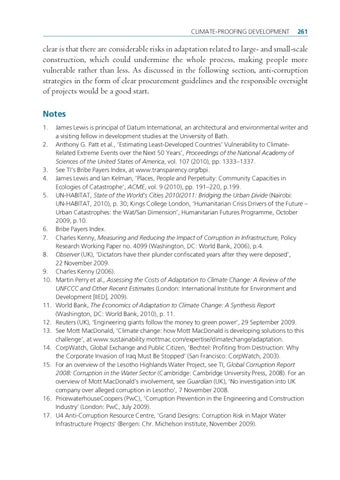CLIMATE-PROOFING DEVELOPMENT
261
clear is that there are considerable risks in adaptation related to large- and small-scale construction, which could undermine the whole process, making people more vulnerable rather than less. As discussed in the following section, anti-corruption strategies in the form of clear procurement guidelines and the responsible oversight of projects would be a good start. Notes 1. 2.
3. 4. 5.
6. 7. 8. 9. 10.
11. 12. 13. 14. 15.
16. 17.
James Lewis is principal of Datum International, an architectural and environmental writer and a visiting fellow in development studies at the University of Bath. Anthony G. Patt et al., ‘Estimating Least-Developed Countries’ Vulnerability to ClimateRelated Extreme Events over the Next 50 Years’, Proceedings of the National Academy of Sciences of the United States of America, vol. 107 (2010), pp. 1333–1337. See TI’s Bribe Payers Index, at www.transparency.org/bpi. James Lewis and Ian Kelman, ‘Places, People and Perpetuity: Community Capacities in Ecologies of Catastrophe’, ACME, vol. 9 (2010), pp. 191–220, p.199. UN-HABITAT, State of the World’s Cities 2010/2011: Bridging the Urban Divide (Nairobi: UN-HABITAT, 2010), p. 30; Kings College London, ‘Humanitarian Crisis Drivers of the Future – Urban Catastrophes: the Wat/San Dimension’, Humanitarian Futures Programme, October 2009, p.10. Bribe Payers Index. Charles Kenny, Measuring and Reducing the Impact of Corruption in Infrastructure, Policy Research Working Paper no. 4099 (Washington, DC: World Bank, 2006), p.4. Observer (UK), ‘Dictators have their plunder confiscated years after they were deposed’, 22 November 2009. Charles Kenny (2006). Martin Perry et al., Assessing the Costs of Adaptation to Climate Change: A Review of the UNFCCC and Other Recent Estimates (London: International Institute for Environment and Development [IIED], 2009). World Bank, The Economics of Adaptation to Climate Change: A Synthesis Report (Washington, DC: World Bank, 2010), p. 11. Reuters (UK), ‘Engineering giants follow the money to green power’, 29 September 2009. See Mott MacDonald, ‘Climate change: how Mott MacDonald is developing solutions to this challenge’, at www.sustainability.mottmac.com/expertise/climatechange/adaptation. CorpWatch, Global Exchange and Public Citizen, ‘Bechtel: Profiting from Destruction: Why the Corporate Invasion of Iraq Must Be Stopped’ (San Francisco: CorpWatch, 2003). For an overview of the Lesotho Highlands Water Project, see TI, Global Corruption Report 2008: Corruption in the Water Sector (Cambridge: Cambridge University Press, 2008). For an overview of Mott MacDonald’s involvement, see Guardian (UK), ‘No investigation into UK company over alleged corruption in Lesotho’, 7 November 2008. PricewaterhouseCoopers (PwC), ‘Corruption Prevention in the Engineering and Construction Industry’ (London: PwC, July 2009). U4 Anti-Corruption Resource Centre, ‘Grand Designs: Corruption Risk in Major Water Infrastructure Projects’ (Bergen: Chr. Michelson Institute, November 2009).
GLOBAL_CORRUPTION_CS4.indb 261
3/15/2011 9:42:27 AM
